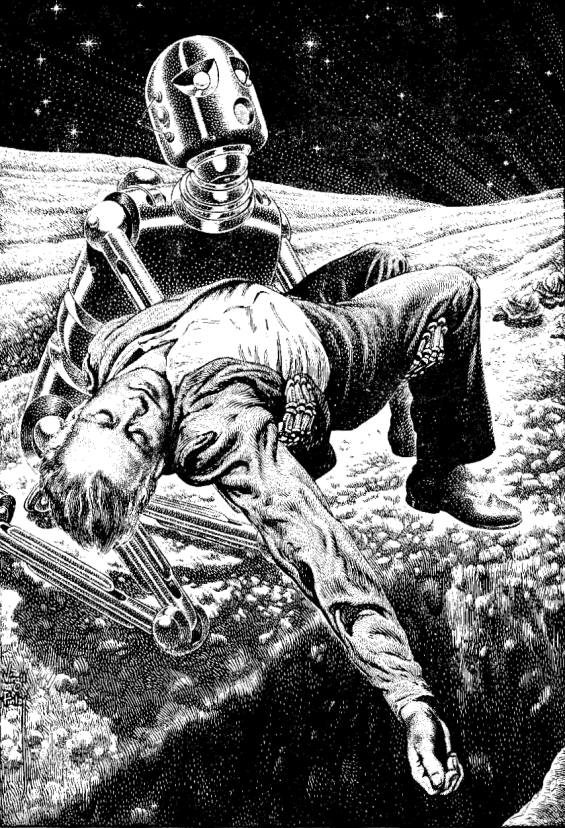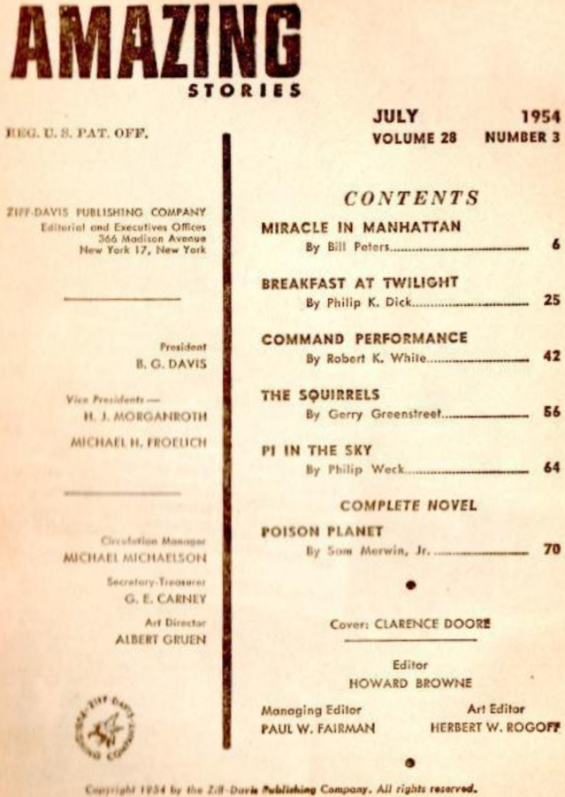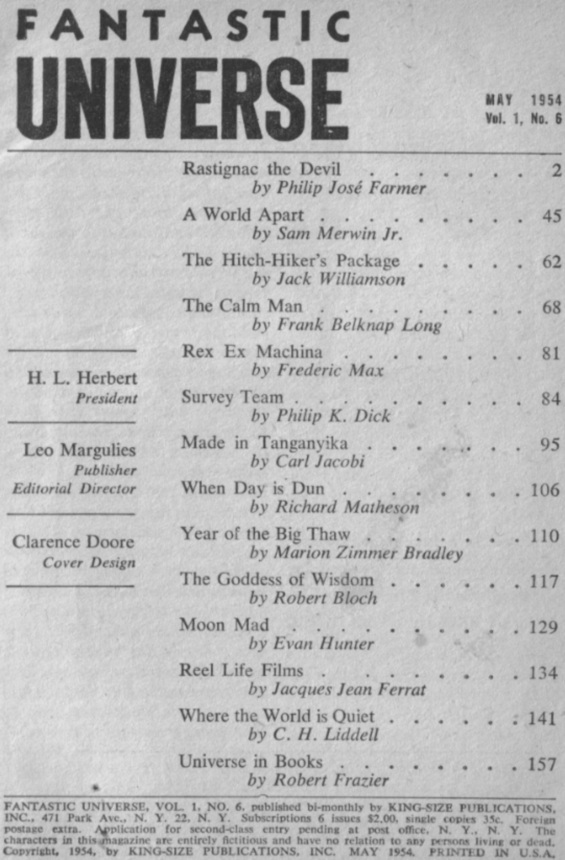
 The SFFaudio Podcast #207 – Jesse, Julie Davis, and Rose Davis talk about Galactic Pot-Healer by Philip K. Dick.
The SFFaudio Podcast #207 – Jesse, Julie Davis, and Rose Davis talk about Galactic Pot-Healer by Philip K. Dick.
Talked about on today’s show:
the premise, a Lovecraftian monster, malign desires upon the Earth, The Call Of The Cthulhu, H.P. Lovecraft and Philip K. Dick, dead and not dead, city vs. cathedral, what if Cthulhu was a nice god?, Robert Sheckley, Voltairian style of comedic adventure, even the ending is a joke, super-depressing dystopian earths, “a machine-like” state of being, everyone in the book is suicidally depressed, the Glimmung, everyone is afraid of failure, I want you to map all the themes and the rising action, an existential book, the value and importance of work, the best pot-healer on Earth, failed marriage, “the game is so depressing”, clever but not uplifting, this is about our society (Twitter and podcasts), totally relevant for the internet age, Molly Yoyez, Richard Matheson’s repeated theme of the disconnection between people, “he you should listen to my podcast”, at least you can laugh, the last line of the book, the best of them, instead of just fixing or healing what is broken he is becoming a creator, “the pot was awful”, Philip K. Dick’s personal relationship with religion, history, church history, Roman history, wordplay, the meaning of “Mare Nostrum”, medicine of secret composition a placebo or patent medicine, to give them hope, agape, keritas, Happy Catholic, a body of Christ analogy, the power of Jesus, Christ stands empty handed, pointless existence, existential ennui or a disaffection with a lack of meaning in the universe (going back to Lovecraft), a symbolic version of deep time, a Jungian interpretation, the collective unconscious, is Joe Fernwright trying to find his soul?, his dead self, come to terms with death, “it’s your corpse”, “I have a box I’ve made”, it’s a coffin, distraction, the book title game, there are more allusions per square inch than other novels, Faust, albatrosses, “what Christ really was”, Willis the robot, unlimited power and unlimited knowledge, why does this cathedral need to be raised?, you love things that are stronger than you, forbidden love, “he felt apathy and there was nothing to be apathetic about”, incest, Amalita and Borel, God the creator, what is a cathedral essentially?, it is a church or THE Church, the bivalve character, the Book of the Calends, people being saved through work, “the robots are more alive (and human) than the people”, “the whole thing about robots”, ignoring your programming, Costco robots, “you can’t take pictures in here”, she could disregard the policy but she chooses not to, buckle your seat-belt, “whether you have a fate or not”, Willis doesn’t just do this roboting thing (he has aspirations to be a writer), thinking of other people not as people, The Best Exotic Marigold Hotel, LEGOing, WiFi vs. wireless, “be a human being for a minute”, programmed dreams, is the book prescient?, colostomy bag installation, it is inhumane not to be full of agape and keritas and worry for other people, the scene at the spaceport, THX-1138, We by Yevgeny Zamyatin, “I gaze across the silence of the marshes”, the padre booth scene, Zen, “you have worked and not worked”, Puritan Ethic, Roman Catholic, Allah, Judaism, “a bowl of Martian fat-worm soup”, the dystopia of regulation and efficiency, friending and unfriending, if this is a book about religion…, pots are what he loves, why didn’t Joe break pots?, the spider in the cup, the little fisherman of the night, “the great fisherman of the night”, this is a book about doing not having done, aspiring and aspiration, busy work and the game, Snake by D.H. Lawrence, But even so, “from out the dark door of the secret earth”, The Rime Of The Ancient Mariner by Samuel Taylor Coleridge, the bottle in the toilet tank, was there a giant snake down there?, the bones of a Black Glimmung, the bones looked like the bones of an Ark, come and be saved (a new Testament ark), beings in distress, the Glimmung is forcing their hands, “he loved us because we were alive”, Amalita means hard work, Calends -> Calendar, taxes, the ides of March, the allusions to Faust, Faustian-man striving upwards never satisfied, overcoming our bad-selves, reconcile yourself to death, overcome a fear of failure, the pot at the end of the world, “why didn’t you try something”, God in Genesis was very Faustian, Johann Wolfgang von Goethe, co-creators with God, the swamp is the flooding of the perfect and the beautiful, Midnight In The Sunken Cathedral by Harlan Ellison, the fog-things of antiquity, infirm and senile, you can get a lot done on the telephone, Mr. Job and Mr. Lawyer, the robots are just as inhumane as the humans, the interplan corn and wheat bank, communism as absorbed into capitalism, crumbles as a unit of currency, Ploghman’s Planet, manifesting, the hovercraft, hello to you too, reading into it more, Julie wants to force Scott to read this book, poetry, Jesse reads The Raft Builders by Lord Dunsany, “hastily making rafts”, The Epic Of Gilgamesh, Robert Silverberg, other Philip K. Dick books, Philip K. Dick’s common book (The Exegesis), Galactic Pot-Healer is a piece of art, it was crafted, weaved, A Scanner Darkly, plots vs. ideas, having once thought to kill a senator, suicide, suicide by cop, upon re-reading, the use and abuse of drugs, ‘archaeologists will find him and know he was a misunderstood superman because he was holding a copy of Ayn Rand’s The Fountainhead‘, nihilism, Kurt Vonnegut, Harrison Bergeron, 2081, whack-job libertarian idea, the problem isn’t “the nanny state”, the inexplicably of Kurt Vonnegut’s popularity, the hopelessness of his books, triteness, Philip K. Dick’s deeper themes, Philip K. Dick’s simple short stories, “what is it that you find that’s better?”, the people are the pot = mind blown!, the cover art of Galactic Pot-Healer, how Glimmung manifests himself in the world is how Jesse imagines Julie, and Scott and Rose see God in the world, Glimmung has no concern for self-dignity, “Don’t lose faith. -G.”, this book is about depression, being out of work, suicide, “I have my own black dog I need to fight”, “I love this book”, “It is a great book.”


Posted by Jesse Willis

 Vulcan’s Hammer
Vulcan’s Hammer








